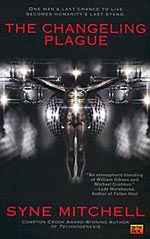
![]() Thomcat
Thomcat
4/1/2013
![]()
This near-future story starts off as a thriller, and handles the page-turning suspense well. In a nutshell, a guy with money and cystic fibrosis plays fast and loose with a genetic researcher who crafts a virus to correct his disease at the DNA level. Of course, the researcher didn't code for patients without CF, and didn't think the virus could get out into the wild. While certainly not a new idea, it works well here.
There are three main characters, and chapters are focused on one of their points of view. We follow each as a new plague develops, with lightning propagation and a greater than 90% mortality rate. The gene researcher tries to figure things out, the hacker provides information, and patient zero deals with his angst. Each is well drawn and has a believable motivation.
By chapter 13, researchers in Japan develop a vaccine, and the whole character of the story changes. After the required vaccinations, the rest of the world gets ready to move on, and most labs stop working to find a cure. This leaves patient zero (and the other victims) as an outcast and the researcher full of angst. The hacker, on the other hand, has started to treat this virus, and DNA modifications in general, as a sort of computer language, and works to hack the bio-system.
Infected persons are susceptible to other mutations, and these are at the DNA level. Putting them together in camps leads the victims to share DNA, to become more alike. For the hackers, this means other modifications can be introduced. Both groups are now the "changelings" of the title, and both are shunned by society.
The dehumanization of victims and the fear of the uninfected lead to the climax of the novel, and reflect on how we treat the outcasts of our societies today. Protests and politics are both touched on. I found the transition from thriller to social commentary worked well.
Was the science correct, or close? I find it hard to believe that DNA modification would express itself so quickly, and the gene sequencer machines seem too powerful, but other than that the science felt fine for a near-future novel. A few of the computer terms were a little dated, but then this novel was published 10 years ago.
In short, author Syne Mitchell has crafted an excellent story, shifting gears partway through to arrive at a thought provoking conclusion. I plan to seek out her first novel, the Compton Crook award winning "Murphy's Gambit," in the near future. "The Changeling Plague" is worthy of five stars.